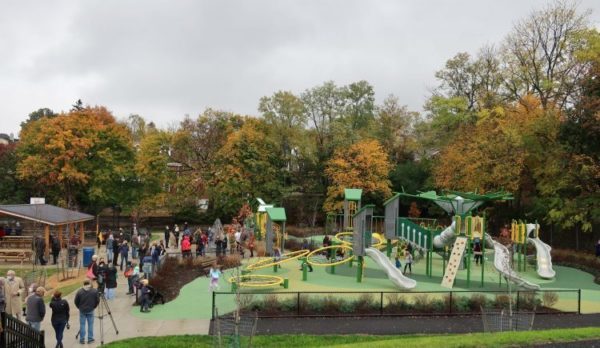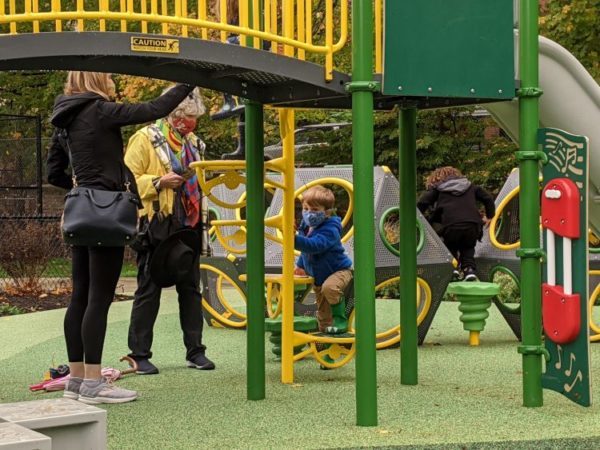
Squirrel Hill’s Wightman Park renovation welcomes all ages, abilities and interests
Photo: Wightman Park after renovations. Photo courtesy of the City of Pittsburgh.
This story first appeared in NEXTpittsburgh, the go-to publication about the people advancing Pittsburgh and the innovative and cool things happening in the region. See more stories here and sign up to get their newsletters.
To celebrate Wightman Park’s reopening, Councilperson Erika Strassburger slid down the brand-new slide built into the hillside embankment right into the park.
After four years of work, Wightman Park in Squirrel Hill has reopened to the public at 5612 Solway Street. What was once an under-utilized two-acre ball field with deteriorated playground equipment now features an inclusive new playground and a host of new amenities.

The project also attempts to solve stormwater drainage problems that have plagued nearby neighborhoods.
“This park should be a model for all the parks in Pittsburgh,” said Strassburger at a ribbon-cutting ceremony on Wednesday afternoon. “And while this park can and will welcome everyone regardless of age, ability, interest and neighborhood, I truly believe that every neighborhood deserves a park this wonderful.”
The park prioritizes inclusion for children of different abilities along with a focus on sustainability, recreation and beautiful design, she adds.
There are distinct play areas, one for toddlers ages 2 to 5 and another for children ages 5 to 12, with an array of slides, tunnels, netting and other climbing equipment.
There’s also a new covered wooden picnic pavilion open to the community along with a walking track and a half-court basketball hoop.
In addition, the park also features a large green space, suitable for everything from frisbee to soccer, baseball and softball. New family restroom facilities are included with an adult changing table, the first in a public space in Pittsburgh.
“The inclusion of an adult changing table was an important request from the community,” says Senior Project Landscape Architect Andrea Ketzel with the City of Pittsburgh Department of Public Works. “We heard from parents and caretakers of children with differing physical abilities. They communicated the struggles that they face in a public setting when caring for their children who have outgrown a standard baby changing table. The table will allow parents and caretakers to provide for their grown children or adult family members in a safe, sanitary and private location.”
Artists Oreen Cohen and Alison Zapata of OOA Designs created metal sculptures, inlaid with colorful panes of glass that merge the forms of falling water and pollinating insects, that are child-safe and act as benches.
“OOA Designs worked with the children of the nearby Carriage House to create drawings of butterflies, bugs and natural elements for inspiration in the sculptures,” says Ketzel.

The park doubles as a massive stormwater retention project, featuring green infrastructure such as rain gardens and plantings along with retention tanks beneath the park and additional stormwater storage capacity under the sidewalks. The city estimates that this will capture two million gallons of stormwater every year, and provide 50,000 cubic feet of storage.
“This site is very unique in that it sits at a low point in the topography,” says Ketzel. “When you visit the park, you might notice that the site is bowl-shaped and the perfect place to hold water. Many years ago, it held water permanently and was used as a skating rink in the wintertime. Early in the public engagement process, we received complaints from neighbors about their basements flooding and engaged with PWSA (Pittsburgh Water and Sewer Authority) to collaborate on a park renovation that also included stormwater management.”
The next phase of the stormwater project will involve improving drainage along local streets and directing stormwater towards the park. This will keep it out of people’s basements, and sewer overflows into the Monongahela River. The improvements will feature stormwater “bump out” planters at intersections, and channel drains that convey stormwater under the street between planters.
The Wightman Park project was a joint effort between the City of Pittsburgh ($3 million) and the PWSA ($2 million). The funding came from their capital budgets, as well as state, federal and local grants, says Ketzel. ALCOSAN awarded $352,047.92 for to the City of Pittsburgh and $2,992,426.96 to the PWSA for the project through their Green Revitalization of Our Waterways (GROW) program.